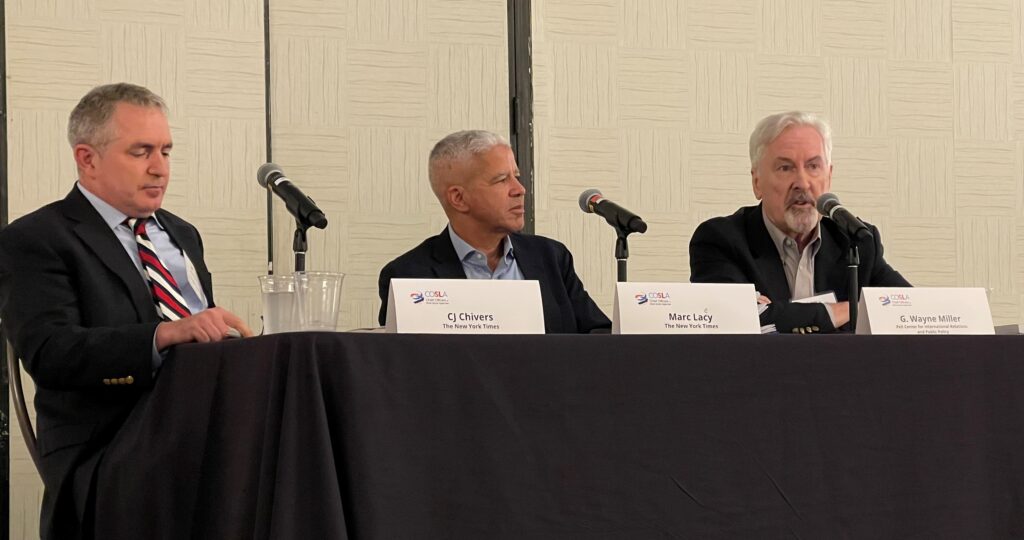Miller Sits on New York Times Panel on News Media and Democracy
Photo courtesy of Dr. Darrell Williams, Superintendent, Wisconsin Division for Libraries and Technology
Book banning and the increased prevalence of ‘news deserts’ continue to underscore the importance of access to news and information, a challenge librarians and journalists are tackling together in a recent New York Times panel.
NEWPORT, R.I.– Book banning, misinformation, the need for a strong press to ensure a healthy democracy, the importance of civics education, intimidation of and threats against librarians and journalists, fact-checking before news publication, prompt corrections when errors are published, the future of journalism in an era of news deserts and ghost papers. These were among the topics discussed at a recent New York Times panel.
The panel, “On Journalism and Democracy: The Role of a Vibrant Press in Our Communities,” featured New York Times Managing Editor Marc Lacey, Pulitzer-winning Times staff writer C.J. Chivers, and journalist G. Wayne Miller, director of the Ocean State Stories and co-host and co-executive producer of the national PBS TV/SiriusXM show Story in the Public Square.
The October 30 panel, at Newport Harbor Island Resort, was part of the 50th annual meeting of the Chief Officers of State Library Agencies (COSLA).
“Librarians and journalists are joined at the hip in advocating for something that should not be controversial–reading,” said Lacey. “What a pleasure to delve into the challenges that both professions are facing today.”
“Journalists and libraries face the overlapping threats of misinformation, calls for censorship, and purposeful intimidation, all aimed at muting the difficult conversations our communities and our world require,” Chivers said. “It was an honor to discuss these issues with two leading voices in my profession and leading libraries from around the nation.”
“Based on the audience’s many questions and our discussions with COSLA members, I’d say the afternoon was a great success. I echo what Marc and Chris said about the shared interests of journalists and librarians,” said Miller
“Libraries are community gathering places that provide free access to information for all members of their community, regardless of viewpoint or circumstance, and as such, serve as a cornerstone of democracy,” said Karen Mellor, Chief of Library Services, the Rhode Island Office of Library & Information Services and local host of the event. “Equally important is access to a vibrant free press that at its best informs and stimulates public discourse.
“This panel underscored the symbiotic relationship between libraries and journalism and the responsibility of both institutions to continue to provide access to unbiased and accurate information to inform the public and stimulate a healthy discourse on topics that affect our communities and the lives of individuals at home and around the world. The chief officers in attendance also gained a deeper understanding of the processes that high quality news organizations employ to ensure accurate and fair reporting.”
According to Mellor, chief library officers representing 46 states and the US Territory of the Northern Mariana Islands gathered in Newport from October 29 to November 1 for the 50th-annual meeting, which also included sessions on a variety of other topics and updates on national policies and issues. Guests included Rhode Island senior Senator Jack Reed, “the leading advocate for libraries in the U.S. Senate and sponsor of legislation that provides federal funding for libraries,” and director Crosby Kemper of the federal Institute of Museum and Library Services.
G. Wayne Miller is the director of the Pell Center’s Ocean State Stories initiative, a non-profit, non-partisan news publication devoted to in-depth coverage of issues of importance to Rhode Islanders. Visit Ocean State Stories online.

